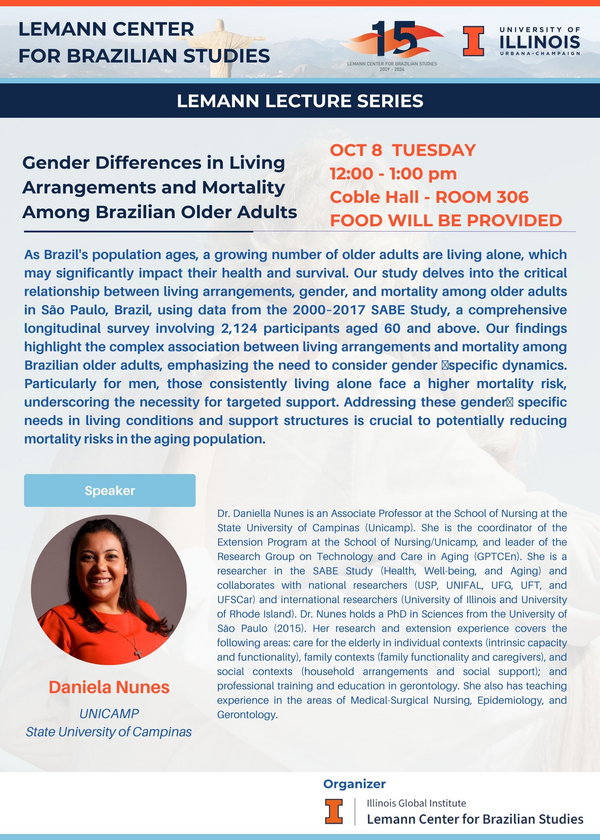
Lemann Lecture Series | Daniela Nunes | Gender Differences in Living Arrangements and Mortality Among Brazilian Older Adults
- Event Type
- Lecture
- Sponsor
- The Lemann Center for Brazilian Studies
- Location
- Coble Hall 306
- Date
- Oct 8, 2024 12:00 - 1:00 pm
- Speaker
- Dr. Daniella Nunes is an Associate Professor at the School of Nursing at the State University of Campinas (Unicamp). She is the coordinator of the Extension Program at the School of Nursing/Unicamp, and leader of the Research Group on Technology and Care in Aging (GPTCEn). She is a researcher in the SABE Study (Health, Well-being, and Aging) and collaborates with national researchers (USP, UNIFAL, UFG, UFT, and UFSCar) and international researchers (University of Illinois and University of Rhode Island). Dr. Nunes holds a PhD in Sciences from the University of São Paulo (2015). Her research and extension experience covers the following areas: care for the elderly in individual contexts (intrinsic capacity and functionality), family contexts (family functionality and caregivers), and social contexts (household arrangements and social support); and professional training and education in gerontology. She also has teaching experience in the areas of Medical-Surgical Nursing, Epidemiology, and Gerontology.
- Contact
- Lemann Center
- lemann@illinois.edu
- Views
- 86
- Originating Calendar
- Lemann Center Events
As Brazil's population ages, a growing number of older adults are living alone, which may significantly impact their health and survival. Our study delves into the critical relationship between living arrangements, gender, and mortality among older adults in São Paulo, Brazil, using data from the 2000–2017 SABE Study, a comprehensive longitudinal survey involving 2,124 participants aged 60 and above. Our findings highlight the complex association between living arrangements and mortality among Brazilian older adults, emphasizing the need to consider gender specific dynamics. Particularly for men, those consistently living alone face a higher mortality risk, underscoring the necessity for targeted support. Addressing these gender specific needs in living conditions and support structures is crucial to potentially reducing mortality risks in the aging population.
Food will be provided.